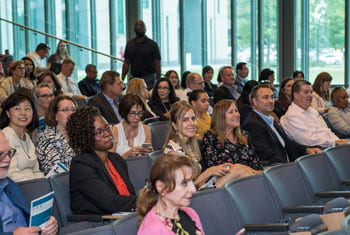Crisscrossing the country or flying around the globe is part of a day’s work for Marshall Goldsmith, who is by most accounts the world’s leading executive coach. He has racked up millions of miles and he’s an “executive platinum” flier on American Airlines, a status he jokes about because it was made famous by George Clooney’s character in the movie “Up in the Air.”

Marshall Goldsmith, right, introduces himself to an audience member in advance of his presentation at Rice. Photos by Tommy LaVergne
Goldsmith, a genial and disarming 70-year-old, visited Rice Sept. 9-10 to share some of the key insights he’s gleaned from teaching more than 150 CEOs and their management teams to become effective leaders. He also explained why an exercise called “feedforward” can work better than the often-awkward and dreaded practice of soliciting feedback from your peers and supervisors.
Goldsmith’s visit was hosted by Rice’s Doerr Institute for New Leaders, the country’s first professional leadership development program offered for free to all undergraduate and graduate students. Tom Kolditz, the Doerr Institute’s executive director and a retired brigadier general, introduced Goldsmith at a public presentation Sept. 10 and noted his stature as a leadership thinker and prolific author of several best-selling books.
“His books are read because they’re useful,” Kolditz told the capacity audience gathered in the Glasscock School of Continuing Studies’ Hudspeth Auditorium. “Anyone who has followed Marshall … understands how valuable his concepts are. The world has recognized that coaching is not a remedial operation, that coaching is for high-potential people, and that’s what we have at Rice. At a company, they’ll identify a small band of individuals and call them high-potentials. One-hundred percent of Rice students are high-potentials from our perspective.”
Goldsmith’s book, “What Got You Here Won’t Get You There” — which was inspired by his mentor, management pioneer Peter Drucker — summarizes 20 major challenges and bad habits of successful people. As Drucker put it, “We spend a lot of time teaching leaders what to do. We don’t spend enough time teaching leaders what to stop.”

Members of the Rice and Houston professional leadership coaching communities attended the interactive two-hour presentation.
Goldsmith notes that at a certain professional level, neither intelligence nor skill accounts for the fact that some people continue to advance while others plateau. What differentiates the one from the other, he says, has nothing to do with ability, experience and training — and everything to do with behavior. Simply put, Goldsmith explains, successful people often limit themselves with behavioral tics that they don’t even know they have.
The No. 1 bad habit of the successful is “winning too much,” Goldsmith emphasized. He believes the hypercompetitive need to best others underlies nearly every other behavioral problem.
“Winners love winning,” Goldsmith said. “It is incredibly difficult for winners not to constantly win. We are so competitive we have to prove we are more miserable than the people we live with.”
It is more important at the lower levels of the organization, Goldsmith notes, but as one move ups, it becomes less essential.
A second challenge for the successful is “adding too much value,” Goldsmith said, an inclination that drives smart people to tinker with colleagues’ or subordinates’ already viable ideas. When an employee approaches a successful person with an idea, the natural tendency usually is to say, “That’s a nice idea, why don’t you add this to it?” Goldsmith said. “The problem is the quality of the idea may go up 5%, (but) my commitment to execute may go down 50%. ‘It’s not my idea, boss, now it’s your idea.'”
‘Feedforward’ to the future
In theory, constructive feedback is supposed to focus on the performance, not the person. In practice, almost all feedback is taken personally no matter how it is delivered, Goldsmith said. Successful people’s sense of identity is highly connected with their work. The more successful people are, the more this tends to be true. Right or wrong, feedback is associated with judgment.
To avoid the trap of dwelling on the past, passing judgment and failing to commit to improve, Goldsmith developed the “feedforward” exercise, which has only two rules: Learn as much as you can and help as much as you can.
To start, everyone in the exercise finds a partner. The first person says, for example, “My name is Joe and I want to be a better listener,” then asks for one or two ideas for the future, with no feedback about the past. Whatever the partner suggests, Joe remains quiet, listens and says thank you. Then it’s Joe’s partner’s turn and the process is repeated. Each person in the group talks to as many people as possible during the time allotted.
“We often learn more from people we don’t even know,” Goldsmith said. “They don’t have baggage, they don’t have history, they have more diversity. We don’t have to know people to help people.”
As part of his visit to Rice, Goldsmith spent extensive time with more than 30 coaches from Houston’s professional leadership coaching community who work with Rice students participating in the Doerr Institute’s programming.
The Doerr Institute was established in 2015 with significant support from Rice alumni John and Ann Doerr. Ann Doerr, who serves on the university’s board of trustees, attended Goldsmith’s talk.
Prior to joining Rice, Kolditz taught as a professor in the practice of leadership and management and director of the Leadership Development Program at the Yale School of Management. He also led the Department of Behavioral Sciences and Leadership at the U.S. Military Academy for 12 years and is a finalist for this year’s Thinkers50 Coaching and Mentoring Award presented in partnership with Goldsmith. The winner of the international award will be announced Nov. 18 in London.


